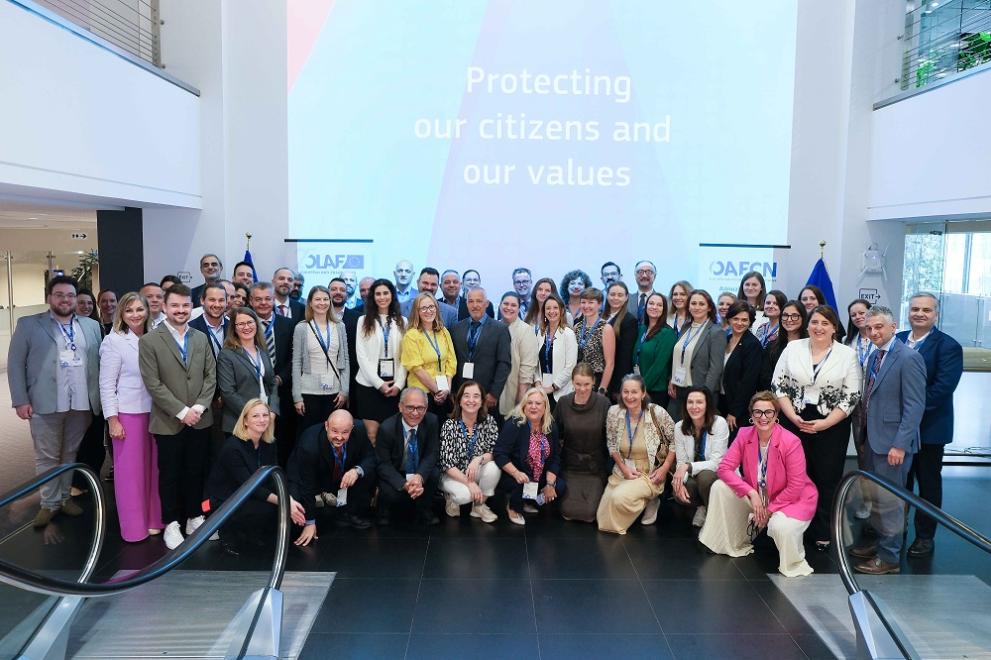
Press release no. 10/2024
PDF version
The European Anti-Fraud Office (OLAF) organised the annual meeting of the OLAF Anti-Fraud Communicators Network (OAFCN), bringing together over 50 communication professionals from national authorities. The two-day event, which took place on 2-3 July in Brussels, aimed at strengthening collaborative efforts and enhancing communication strategies in the fight against fraud affecting the financial interest of the European Union.
Highlighting the importance of the OLAF Anti-Fraud Communicators Network, OLAF Director-General Ville Itälä said: “As we celebrate 25 years of OLAF, effective communication remains a cornerstone in the fight against fraud. OAFCN members play a very important role, they inform citizens of activities that protect them, their money and society, which deters others from carrying out fraud. By sharing knowledge and aligning strategies, OAFCN members are able to ensure that the anti-fraud message reaches all. This meeting underscores our commitment to transparency. IT will also increase collaboration between OLAF and the OAFCN resulting in increased joint effort and more robust and effective anti-fraud campaigns.”
During the two-day conference, participants had the opportunity to explore and discuss the use of Artificial Intelligence in communication getting an overview of the existing tools and discussing the benefits and risks of using AI for communication and public interaction. Members gave an inspirational overview of their anti-fraud communication campaigns in the past year, shared best practices and how they focussed their anti-fraud, anti-corruption messages.
The wide variety of topics presented and discussed ranged from communication campaigns to promote the zero tolerance to fraud, corruption, gambling or nepotism, use of gamification to increase engagement, through IT and communication tools to promote transparency and accountability, to recruitment campaigns or those to mark important corporate anniversaries, such as the 250th of Guardia di Finanza or 25th of OLAF.
The network also heard from a representative of the Ukrainian National Agency on Corruption Prevention (NACP) about the communication strategy of the Ukrainian government aimed at changing citizens’ attitudes to corruption.
The meeting concluded with participants reiterating their commitment to continuous improvement and innovation in anti-fraud communication.
Background
The meeting was an annual event organised by the OLAF Anti-Fraud Communicators' Network (OAFCN). The OAFCN was created in 2001 and is a unique cross-European network of communication experts working on anti-fraud issues. The Network brings together Communication Officers and Spokespersons from OLAF's operational partners in the Member States (i.e. customs, police, law enforcement agencies, Member States' Anti-Fraud Coordination Services (AFCOS) and prosecutors' offices). It plays a pivotal role in communicating the threat of fraud to the public across all EU Member States, as well as the joint efforts made by national and European authorities to combat it. It is a key platform for raising awareness and reaching out to various audiences on fraud issues.
The objectives of OAFCN is to prevent and deter fraud through a permanent dialogue, reinforced cooperation, and joint communication initiatives bringing together communicators from all the European bodies dealing with anti-fraud issues.
OLAF mission, mandate and competences:
OLAF’s mission is to detect, investigate and stop fraud with EU funds.
OLAF fulfils its mission by:
• carrying out independent investigations into fraud and corruption involving EU funds, so as to ensure that all EU taxpayers’ money reaches projects that can create jobs and growth in Europe;
• contributing to strengthening citizens’ trust in the EU Institutions by investigating serious misconduct by EU staff and members of the EU Institutions;
• developing a sound EU anti-fraud policy.
In its independent investigative function, OLAF can investigate matters relating to fraud, corruption and other offences affecting the EU financial interests concerning:
• all EU expenditure: the main spending categories are Structural Funds, agricultural policy and rural development funds, direct expenditure and external aid;
• some areas of EU revenue, mainly customs duties;
• suspicions of serious misconduct by EU staff and members of the EU institutions.
Once OLAF has completed its investigation, it is for the competent EU and national authorities to examine and decide on the follow-up of OLAF’s recommendations. All persons concerned are presumed to be innocent until proven guilty in a competent national or EU court of law.
For further details:
Pierluigi CATERINO
Spokesperson
European Anti-Fraud Office (OLAF)
Phone: +32(0)2 29-52335
Email: olaf-media@ec.europa.eu
https://anti-fraud.ec.europa.eu
X: @EUAntiFraud
LinkedIn: European Anti-Fraud Office (OLAF)
Theresa ZAHRA
Deputy Spokesperson
European Anti-Fraud Office (OLAF)
Phone: +32 (0)2 29-57270
Email: olaf-media@ec.europa.eu
https://anti-fraud.ec.europa.eu
X: @EUAntiFraud
LinkedIn: European Anti-Fraud Office (OLAF)
If you’re a journalist and you wish to receive our press releases in your inbox, please leave us your contact data.
Details
- Publication date
- 3 July 2024
- Author
- European Anti-Fraud Office
- News type
- OLAF press release